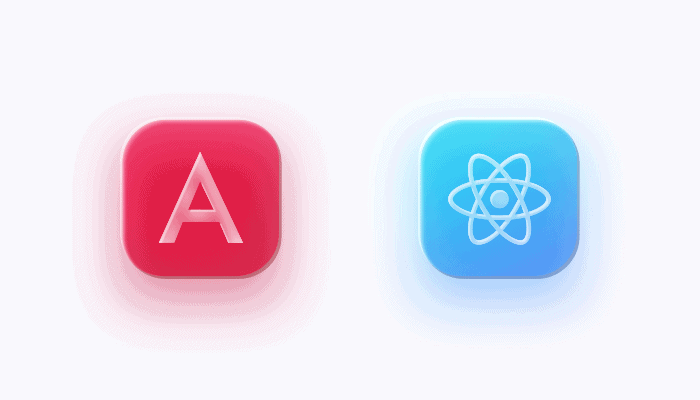
Today, the question “AngularJS or ReactJS” is in the same league as “tea or coffee”. Both are popular JavaScript frameworks, both have huge armies of loyal supporters, both are at the core of top websites. Both have strong development teams behind them – AngularJS was created by Google while ReactJS is a brainchild of Facebook. At the same time, when you get to choosing the technology stack for your new web app, you will need to choose one or the other.
One thing is clear – both AngularJS and ReactJS are great web development frameworks with lots of features speaking in their favor. However, there are differences, and it may help to know them to make a more informed choice.
The architecture
We have referred both to AngularJS and ReactJS as frameworks, however, this is not completely true. While AngularJS is, indeed, a full JavaScript front-end development framework, ReactJS is only a JavaScript library.
For the developer, this difference means that AngularJS provides the complete MVC (Model-View-Controller) pattern while ReactJS, until recently, only supplied the View. However, in 2019 the React team introduced the Hooks feature that allows building the complete MVC using only React resources.
AngularJS comes with lots of features and functions out-of-the-box that allow you to start building your front-end components right away. ReactJS, in its turn, requires a deeper configuration before you can start actual coding.
On the other hand, AngularJS makes you play by its rules that may be rather strict, while ReactJS gives you more freedom in choosing the resources you are going to use.
The pros and cons of AngularJS and ReactJS
Let’s look at some basic advantages and disadvantages of both AngularJS and ReactJS to see how the framework choice may affect the web development process.
AngularJS
Pros
- Very fast compilation allowing even a very complex code to compile within 3 seconds.
- Two-way data binding improving the view responsiveness.
- High performance due to the use of the library.
- Component-based development ensuring code consistency, the ability to reuse components, better structure organization, and improved testability.
- Top-quality documentation.
Cons
- Rather complex syntax, especially in the earlier versions.
- Steep learning curve.
- Difficulties of migrating from Angular to other frameworks, if needed.
- Strict architecture that may sometimes create development limitations.
ReactJS
Pros
- Easy learning curve. The knowledge of HTML is enough to start writing code for ReactJS.
- Virtual DOM (Document Object Model) allowing a much faster update of web pages in the browser.
- Ability to process high loads.
- One-way data-binding preventing any changes to parent data by child components.
- Lightweight structure.
- Easy migration between versions.
- Server-side rendering making apps SEO-friendly.
Cons
- Special JSX syntax that requires some getting used to.
- Limited out-of-the-box functionality requiring a longer initial setup.
- Specific ecosystem making integration with other tools and platforms more difficult.
When to choose AngularJS or ReactJS
As we have seen from the comparison above, both AngularJS and ReactJS have their strong sides and their weaknesses. The features that each framework offers can affect your choice depending on your project goals.
For example, both AngularJS and ReactJS can build great SPA (single-page applications). However, if your goal is building an MVP, then your logical choice will be AngularJS, as it offers lots of options out-of-the-box. ReactJS, requiring some more complex initial setup, maybe a suboptimal choice here, as for MVPs time is always a critical factor. In short, AngularJS works best when you need to roll out your product as quickly as possible, while ReactJS is practical when you are creating an app that is going to grow and evolve over time.
Other factors that you may consider in choosing the framework for your next web app is the availability of developers with the required skills on your team. As we mentioned already, getting started with AngularJS is not easy and takes some serious learning. Thus, AngularJS should be your choice when you already have AngularJS developers on board, otherwise, the kickoff is going to take much longer.
On the other hand, when you have all the skills required to work with AngularJS, your project can start right away, while ReactJS, being not a complete framework but just a library, still takes some setting up.
To summarize, we recommend that you choose AngularJS when:
- You are building an MVP
- Your project is very time-critical
- You have skilled AngularJS developers available
On the other hand, opt for ReactJS when:
- You are embarking on a large project that is about to grow and scale
- You need flexibility in choosing the tools and libraries that you are going to use
- You do not mind a somewhat longer preparation and setup
Web apps using AngularJS and ReactJS
Among the top apps built using AngularJS, we can find such popular names as:
- PayPal
- Upwork
- Netflix
- Weather.com
- The Guardian
In its turn, ReactJS can also boast a list of famous brands that use this framework to build their applications:
- Facebook (no surprise here)
- Instagram
- The New York Times
- WhatsApp
- Airbnb
Wrap up
This is all to say that no matter which framework you choose you are going to be in good company. Both AngularJS and ReactJS have rightfully claimed their place on the market of front-end development tools and platforms, and the growing number of their supporters is the living proof of their outstanding performance.








